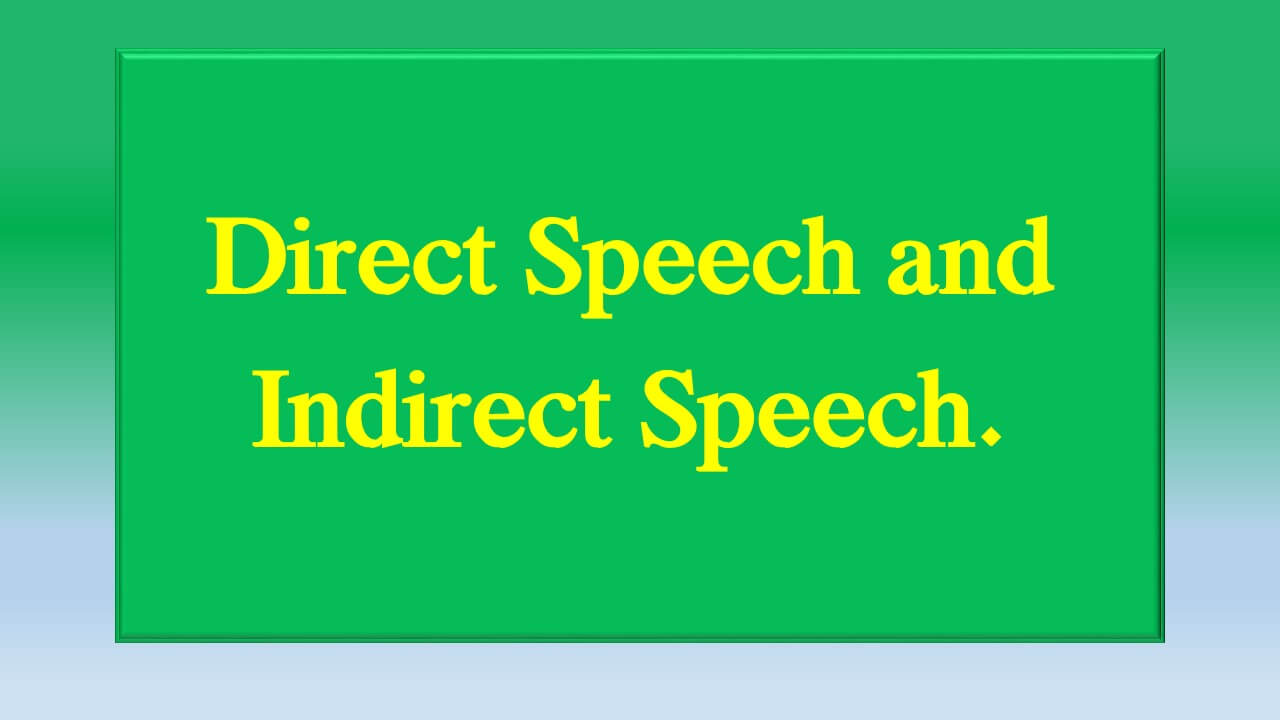Table of Contents
Direct Speech and Indirect Speech.
कथनाचे दोन प्रकार आहेत
1 Direct speech- प्रत्यक्ष कथन
वक्ता आणि श्रोता/श्रोते यांचे आपसातील जे संभाषण असते यालाच
Direct speech असे म्हणतात.
e.g. Gopal said to seeta, “I want to buy a bell’
यात वक्त्याचे शब्द जसेच्या तसे अवतरण चिन्हांमध्ये लिहितात.
टिपः बोलणायाचे शब्द स्पष्ट करण्यासाठी ज्या क्रियापदाची मदत घेतात त्या क्रियापदाला
reporting verb असे म्हणतात.e.g. said.
ब. बोलणाया व्यक्तीला reporting verb चा कर्ता म्हणतात.Ex.Gopal
क.ऐकणाया व्यक्तीला reporting verb चे कर्म म्हणतात.Ex. Seeta
क. Reporting verb चे कर्म लिहिण्याच्या चार पध्दती आहेत.
1.अवतरणचिन्हांच्या बाहेर reporting verb ला to जोडून त्यानंतर
2.अवतरणचिन्हामध्ये सुरवातीस
3.अवतरणचिन्हामध्ये शेवटी
4.अवतरणचिन्हामध्ये साधारण मधोमध
5.अवतरणचिन्हांमध्ये लिहिलेल्या वाक्याला reporting speech असे म्हणतात.
6.Reporting verb नंतर स्वल्पविराम देतात मात्र त्याला कर्म असेल तर
त्यांनतर स्वल्पविराम देतात.
7. Reporting verb चे कर्म Reporting speechच्या सुरवातीस असेल तर
त्यानंतर स्वल्पविराम देतात, मधोमध असेल तर त्याच्या दोन्ही बाजूस आणि
शेवटी असेल तर त्यापूर्वी स्वल्पविराम देतात.
Ex. i) Gopi said, “Today is holiday.”
ii) The King asked, “Is it true, Chattapani, that you have four
virtues?”
iii) The King asked, “What are we to do now, Kalka?”
अवतरणचिन्हांमधील पहिले अक्षर पहिल्या लिपीत लिहितात.
Ex. “I want to buy a T.V.”, said Mohan to Mohini.
– Reported Speech ची विभागणी दोन भागात सुध्दा केलेली असते.
Ex.” If you allow, Your Majesty”, said he, “I’ll do it in a
couple of days”.
Direct Speech and Indirect Speech.
2) Indirect Speech : अप्रत्यक्ष कथन
वक्त्याचे शब्द आपण स्वतःन ऐकता दुसयामार्फत तो वृत्तांत ऐकून घेण्याच्या पध्दतीस
अप्रत्यक्ष कथन असे म्हणतात.
Ex. Gopi said that that day was holiday.
a) Indirect speech मध्ये अवतरणचिन्हांचा लोप करतात.
b) Reporting verb नंतर दिलेला किंवा कर्माशी संबंधीत असलेला
स्वल्पविराम देतात.
c) Indirect Speech विधानार्थी वाक्यातच लिहितात, म्हणून त्याच्या
शेवटी पुर्णविराम देतात.
d) Reported Speech मधील वाक्य कोणत्याही प्रकारचे असले तरी त्याचे
विधानार्थी वाक्यात रूपांतर होते.
e) Indirect Speech करताना स्वल्पविराम व अवतरणचिन्हे कादून
Reported Speech मधील वाक्याच्या प्रकारानुसार conjunction
लिहितात.
1) Indirect Speecdh करताना Reporting Verb मधील वाक्याच्या
प्रकारानुसार Reported Speech मध्ये योग्य तो बदल करतात.
g) Indirect Speech करताना Reported Speech मधील स्थलवाचक
व कालवचक क्रियाविशेषण अव्ययांचा रूपात योग्य तो बदल करतात.
h) Reported Verb चा काळ कधीच बदलत नाही.
Direct Speech मधून Indirect Speech करण्याचे नियमः
काळ बदलण्याचे नियमः
1. Reporting Verb वर्तमानकाळी असेल तर Indirect speech
करताना Reported speech मधील क्रियापदाचा काळ बदलत नाही.
Ex. Rohit says, “It is a bad idea”.
-Rohit says that it is a bad idea.
2) Reporting verb भविष्यकाळी असेल, तर Indirect speech
करताना Reported speech मधील क्रियापदाचा काळ बदलत नाही.
Ex. Gopal will say, “It is a good idea.”
-Gopal will
say that it is a good idea.
3) Reporting verb भूतकाळी असेल,तर Indirect speech
reported speech मधील क्रियापदाचा भूतकाळ करावाच लागतो.
करताना
e.g. Gopal Said, “It is a good Idea”.
-Gopal said that it was a good idea.
1) वरील तीन नियमाचे काळजीपर्वक निरीक्षण केल्यास Reported speech मधील
क्रियापदाचा रूपात काय बदल होतो हे खालील तक्त्यावरून अभ्यासा.
Reporting Verb Reported Speech
a) Say/says
Reported Speech
is
Indirect Speech
is (बदलत नाही) )
b) Will say
Reported Speech
is
Indirect Speech
is(बदलत नाही)
c) Said
Reported Speech
IS
Indirect Speech
was(बदल झाला)
ii) Reported verb भूतकाळातील असताना Indirect speech करताना
reported speech मधील क्रियापदाच्या रूपात होणारा बदल दर्शविणारा तक्ता.
Direct speech
Indirect speech
Direct Speech and Indirect Speech.
Reported speech मधील क्रियापद
बदल झालेले क्रियापद
1)
Direct speech Simple present tense
Indirect speech simple past tense
2)
Direct speech Present continuous tense
Indirect speech Past continuous tense
3)
Direct speech Present perfect tense.
Indirect speech Past perfect Tense.
4)
Direct speech Present Perfect Continuous tense
Indirect speech Past Perfect Continuous tense
5.
Direct speech Simple Past Tense
Indirect speech Past Perfect Tense
6.
Direct speech Past continuous tense.
Indirect speech Past perfect continous Tense
7.
Direct speech Past perfect tense
Indirect speech Past perfect tense.
8.
Direct speech Past perfcet continuous tense
Indirect speech Past perfect continuous Tense
9.
Direct speech Future Tense (shall/will)
Indirect speech Past Tense (would)
10)
Direct speech don’t/doesn’t
Indirect speech didn’t
11)
Direct speech didn’t
Indirect speech hadn’t vpp
12)
Direct speech may/might
Indirect speech might
13)
Direct speech can/could
Indirect speech could
14)
Direct speech must
Indirect speech had to
(15)
Direct speech used to
Indirect speech used to/would
16)
Direct speech dare
Indirect speech dared
17)
Direct speech ought to
Indirect speech ought to have vpp
